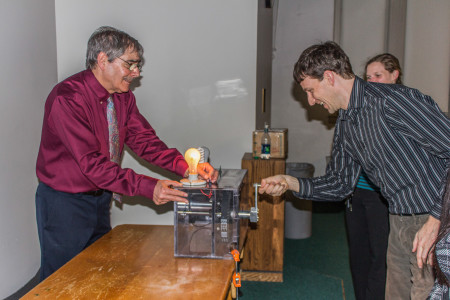According to Richard Wolfson, a physics professor at Middlebury College, 20,000 people in the United States die every year from diseases related to a dependency on fossil fuels. At his talk on Monday, April 13 in ARH 302, Wolfson explained the relationship between energy use and climate change.
Wolfson hails from a liberal arts background, having transferred from Massachusetts Institute of Technology (MIT) to Swarthmore College as an undergraduate student, disliking the MIT environment for himself at that time. He spent much of his career writing about science for people who don’t consider themselves science-minded, such as books about nuclear power and Albert Einstein. He is currently a Middlebury College Benjamin F. Wissler professor of physics, where he also served as the advisor for graduate research to Grinnell professor Eliza Kempton, Physics.
Wolfson visited Grinnell earlier as the Squire Lecturer, named after Harold Squire ’38, who graduated Grinnell with a degree in physics and later went into finance work.
“The tradition has been that the Squire Lecturer gives a research seminar with the physics department … and also gives a more accessible talk as well,” Kempton said.

Photo by Sarah Ruiz.
Because of his interest in interpreting science phenomena for those uninterested in the sciences and his responsibilities as the Squire Lecturer, Wolfson
decide to give a talk oriented toward students majoring in the humanities and social sciences.
“Especially in a complicated field like energy and climate, which are very heavily science-based, I want to try to give people some sense of the basic science behind that, so that we know why we’re confident about what we believe about these things,” Wolfson said.
One of the ways in which Wolfson communicated with non-science students was by bringing an interactive component to his lecture. At his talk, he encouraged students to turn a crank, causing a light bulb attached to the machine to light up.
Wolfson said he wants people to know what it feels like to use a given amount of energy. He explained that he sees the light machine as a way of communicating the magnitude of the numbers that scientists tend to use when talking about energy and climate change.
“I hope to get people visualizing [the energy], but also feeling it,” he said. “I want people to understand what it means to be a member of a society that uses a lot of energy.”
During his talk, Wolfson also explained that although the United States consumes a significant amount more energy than other countries, it also produces food and goods that are exported to other countries, which accounts for some of the energy use. As a result, Wolfson is a strong advocate for greater use of solar panels as an energy source other than fossil fuels.
Wolfson said that he still appreciated his time here interacting with Grinnell students, some of whom even have his own former student, Eliza Kempton, Physics, as a professor.
“[Grinnell students] are enthusiastic,” Wolfson said. “They are intelligent. They know what they want.”

































































